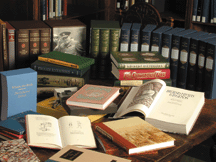
It began in 1784, when King Louis XVI of France gave 100 bound volumes to what was then known as the University of the State of Pennsylvania. Last year, a new round of bookish gifts to Penn from heads of state coincided with the Library’s 250th anniversary and the acquisition of its five-millionth volume.
Fifty-two
nations—and, in some cases, their heads of state—responded to the personal
letters sent out by Penn President Judith Rodin, who invited them to help
celebrate the Library’s anniversary by contributing a gift of books. More
than 250 volumes and other gifts arrived, some with considerable fanfare.
King Fahd of Saudi Arabia sent two magnificent prints of the Koran—one
in Arabic and one in English—from the Royal Printworks, as well as a copy
of Rodin’s letter and the Saudi response written on a silver sculpture
of an open book. The Chinese ambassador (a Penn parent, incidentally)
presented a 101-volume encyclopedia. The United Kingdom’s consul general
presented 77 handcrafted volumes from the Folio Society. The king of Morocco
sent a jeweled ceremonial dagger, as well as two books.
For
all the invocations of royalty, the method of selecting the 87 countries
to whom Penn would send letters was thoroughly democratic: Each country
that had registered an online visit to the Library was chosen (though
not all responded).
“We
knew that our Web-based digital library was a source for academic research
from around the world,” said Dr. Paul Mosher, director of the Library.
“And when we checked our log, which does not identify individual users
but does indicate the ‘country domain’ for each visit, we were delighted
to find over 85 countries on the list.”
Several
heads of state wrote personal letters to accompany their gifts, some of
which were carefully chosen. “The most meaningful to all of us are the
things where there seems to clearly have been a thoughtful response, in
a number of cases from the very person we wrote to,” noted Adam Corson-Finnerty,
the Library’s director of development and external affairs.
“I
am not at all used to being compared to Louis XVI,” wrote Adolf Ogi, president
of the Swiss Confederation. “As a matter of fact, I would rather prefer
to keep my head!”
After
acknowledging that he had wondered whether it would be “possible to find
a book that you do not already have,” Ogi informed Rodin that he was sending
a copy of Collection Schauenburg, containing “some of the most
remarkable maps of early modern Switzerland to survive.”
Ogi
also wrote that Rodin’s “generous comparison with your early benefactor”—Louis
XVI—“did not move me as much as the fact that you were writing from Philadelphia.
We still remember here that Switzerland was much present there
in the minds of the framers of your Constitution and of the first
congressmen under the Constitution. Having given something, we were glad
to get a return when we borrowed American elements for our Constitution
of 1848 … We have nothing honorable to refuse, therefore, to our friends
in such a city.”
He
concluded by assuring her that he was personally “as committed to your
creed as ever you can be: LEGES SINE MORIBUS VANAE!”
Jean
Chrétien, the prime minister of Canada, noted in a handwritten
letter that the subject of one of his two chosen gifts, Sir Wilfred
Laurier and the Romance of Canada, “continues to be a source
of inspiration for me and for many Canadians.”
To
help put its collection over the five-million hump, the Library acquired
a first edition of the Hagadah, printed in Amsterdam in 1695 and
containing the first printed Hebrew map to appear in a Hebrew book; a
virtual book, Race and the Writing of History: Riddling the Sphinx,
by Dr. Maghan Keita; a 172-CD set of the complete works of Johann Sebastian
Bach; and a copy of the original research paper that led to the 2000 Nobel
Prize for Dr. Alan G. MacDiarmid, the Blanchard Professor of Chemistry
[“Gazetteer,” November/December].
“It
was only eight years ago that we celebrated four million, and now we’re
at five,” said Corson-Finnerty. “We always treat that as a special occasion,
and we often will acquire some special things just to say, ‘Well, this
is one of our five-millionth volumes.’”
For
this milestone, some of the volumes that the Library received are special
indeed.
“Many
people have said to us, ‘We know that the University of Pennsylvania is
a very important university, and therefore we want to respond appropriately,’”
said Corson-Finnerty. “That’s why we got the kind of response we got.”




